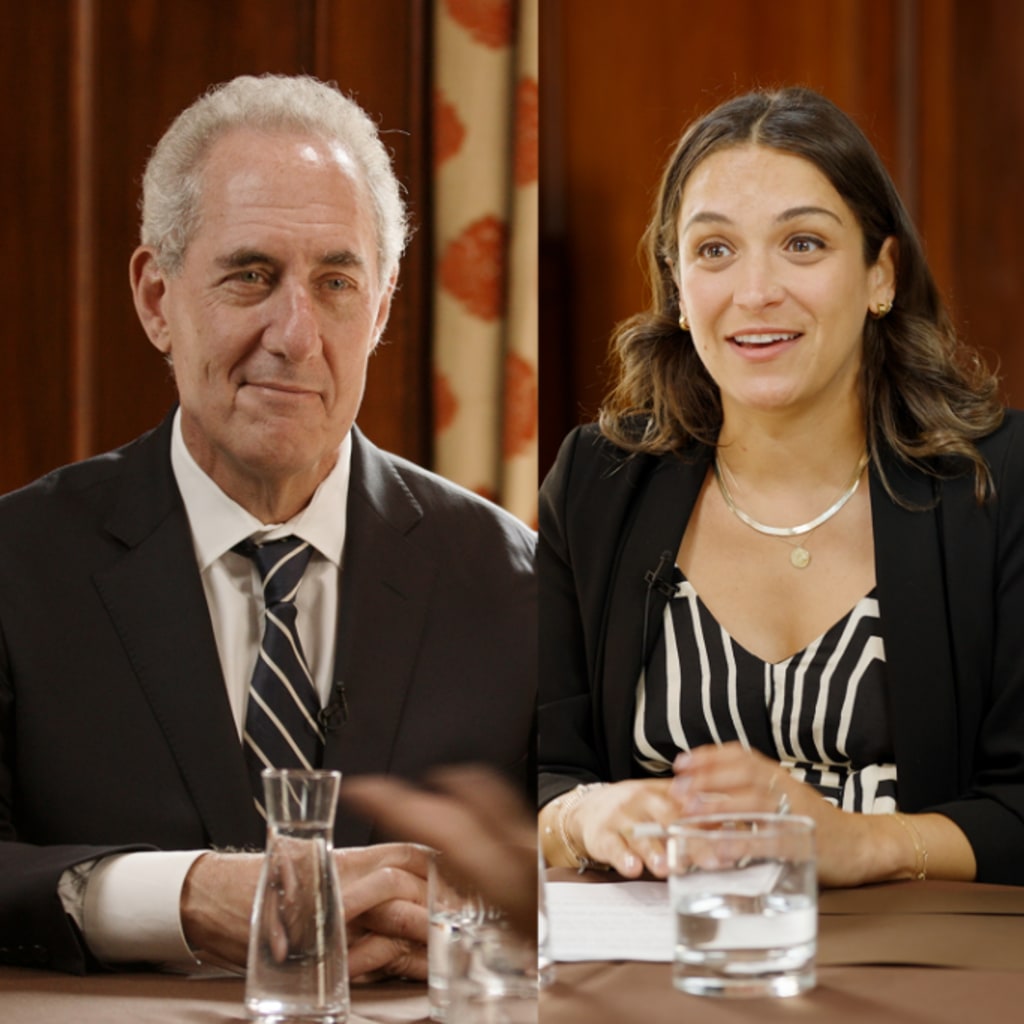Prescription for Disaster
Antibiotics have saved untold millions of lives, but bacteria are learning to outsmart them at alarming rates. Projections show that by 2050, ten million people could die each year from antibiotic-resistant bacteria.
Published
Host
- Gabrielle SierraDirector, Podcasting
Supervising Producer
- Asher RossLead Content Strategist
Audio Producer and Sound Designer
- Markus ZakariaAudio Producer & Sound Designer
Associate Podcast Producer
- Rafaela Siewert
Senior Producer
- Jeremy SherlickDirector of Video
Show Notes
Bacteria are becoming increasingly resistant to antibiotics. A major cause is their overuse in both humans and animals. At the same time, a lack of financial incentives is setting back efforts to discover new classes of antibiotics. The problem is both global and local, and without new initiatives, many common medical conditions could become deadly once again.
From CFR
“The End of Antibiotics?,” Claire Felter
“Antibiotic-Resistant ‘Superbugs’ Are Here,” Laurie Garrett and Ramanan Laxminarayan
Read More
“The Future of Chicken, Without Antibiotics,” Atlantic
“Are Antibiotics Damaging Your Family’s Health?,” Scientific American
Watch or Listen
“We’re Losing the War Against Bacteria, Here’s Why,” New York Times
“A Superbug Survivor Shares His Struggle with Antibiotic Resistance,” Pew Charitable Trusts
“The Antibiotic Apocalypse Explained,” Kurzgesagt
“The Rise of the Superbug,” Al Jazeera
Transcript
SIERRA: So I’ve always been curious. What happens when you don’t finish a whole pack of antibiotics because sometimes you feel better halfway through, and they tell you to take 12, and you’re like, 12? That’s way too much. I’m all set with six.
Kathy TALKINGTON: Right. The challenge is if you take a more limited number then there’s the potential that you kill off some of the bad bacteria that’s being targeted, but some of it survives. And the bacteria that survives, and the bacteria that survives then has the opportunity to learn how to defeat that antibiotic that has been prescribed.
SIERRA: So don’t save the other six and give it to my friend without health insurance.
TALKINGTON: No, please don’t. Please don’t do that.
SIERRA: Noted. Never will!
Antibiotics are one of the most important discoveries in history, and they can seem like a magical cure-all. We take them for granted, and we expect them to fix everything from infected cuts to strep throat. But bacteria are learning to outsmart antibiotics on a massive scale. Hundreds of thousands are dying every year, and that number could soon rise into the millions.
I’m Gabrielle Sierra and this is Why It Matters. Today, what happens when bacteria in our body become resistant to antibiotics. And a curable infection suddenly becomes … incurable.
CBS THIS MORNING: 00:00 This morning, new details on how our food supply is giving rise to antibiotic resistance superbugs.
AL JAZEERA: An invisible but deadly threat has creeped into U.S. hospitals.
BBC NEWS: 00:19 It will spread quickly … and the chances that it will spread globally are very high.
You may have heard about this before on TV or in the news. Or this may be your first time. Either way, antibiotic resistance can be super confusing. I know it was for me. So before we dig into it, let’s get the basics straight.
Antibiotic resistance doesn’t mean your body becomes resistant to antibiotics. Bacteria do.
When you’re sick and you take antibiotics, most of the bacteria get wiped out. Bam, gone, no more sick days, back to work. But some bacteria can be really crafty. They fight off the antibiotic and survive. There aren’t enough left to make you feel sick, but once they reproduce, they can turn into a resistant strain that endangers other people.
This has a chance of happening any time antibiotics are used. The more we misuse them, the stronger the bacteria become.
But in order to understand what a big deal this is, we probably need to take a trip back in time.
SIERRA: So what was life like before antibiotics?
TALKINGTON: The reality before antibiotics were available was that people could die from a simple cut.
This is Kathy Talkington. She directs the project on antibiotic resistance at the Pew Charitable Trusts. Her work is the gold standard in the field. She spoke to us from Pew’s studio in DC.
TALKINGTON: About a third of the deaths pre-antibiotics were due to infections, in the United States. And, you know, when you think about things like childbirth, a lot of folks were dying from that without the advancement of antibiotics. So things that we very much take for granted today back then were just a whole different reality when they were scared of some basic infections.
SIERRA: Life was a lot more risky.
TALKINGTON: It was.
Bacteria. Microscopic organisms. We can’t see them with our naked eye but they’re literally everywhere. They were the first lifeform on earth, and they have helped us breathe, eat, and grow into the species we are today. If bacteria disappeared overnight, then every lifeform on the planet would vanish in a matter of years.
But there’s a flip side; some bacteria are harmful, and they lead to conditions ranging from an infected cut on your finger to diseases like tuberculosis and the plague; diseases that have claimed millions upon millions of lives throughout history.
TALKINGTON: Antibiotics have often been referred to as a miracle drug. And the way they work is they kill off the bacteria by either just killing it or reducing its ability to reproduce. Back in 1928, Alexander Fleming is given credit for finding penicillin, and he was working in his lab, looking at bacteria, and sort of by happenstance, when he came back after being out for a few days, saw that there was mold growing in the petri dish, and what he noticed is the bacteria next to that mold had died off and what’s interesting is when he discovered penicillin, and he fully understood how antibiotics worked, he warned everybody that we have to use these cautiously, that resistance will develop.
FLEMMING: 00:20 And I have a fear that when penicillin can be bought over the counter patients will indulge in over medication, and in many cases they will not take large enough doses, if the dose is too small the microbes will not cured and they will be educated to resist penicillin.
TALKINGTON: And unfortunately, we didn’t heed that advice as we should have, we had sort of a heyday or the golden age of antibiotic discovery where we were staying ahead of the resistance of antibiotics of bacteria. Unfortunately, that didn’t last...Because we have not come up with new what they often call classes of antibiotics, the bacteria are outsmarting us. They’ve defeated or have figured out, in many cases, how to defeat the drugs that we have available.
In fact, the world hasn’t come up with a new “class” of antibiotics since the early 1980s. Think of it this way, the last time we struck a major blow against bacteria, shoulder pads were in, Russia was still the Soviet Union, and Blondie was on top of the charts. For more than 40 years, bacteria have been gaining ground in our race against resistance.
SIERRA: Why can’t we just keep making new and better antibiotics?
TALKINGTON: We currently do not have, enough pharmaceutical companies investing in research and development around antibiotics, because the return is not there. When you think about a company trying to decide, all right, am I going to make a new antibiotic? I know it’s going to cost a lot of money to figure this out and get it through the pipeline and get it to the patient’s bedside. And I know that once I get it across there, I’m not going to be able to sell it very often because we don’t want to use it. And then you compare that to something like a chronic disease drug, where the minute it’s available and it’s better than the most recent one, the sales are going to be higher, the price potentially is higher, and it’ll be used for maybe a lifetime of that patient. So the calculation is very different compared to other opportunities.
SIERRA: Right. Money talks. Demand talks.
TALKINGTON: Right.
Drugs that patients will take every day for the rest of their lives can earn a lot of money. Take the arthritis drug, Humira, which registered 19.9 billion dollars in global sales in 2018. Antibiotics just can’t compete with those numbers. And so there’s not a strong financial reason to develop them.
But let’s say things change in the United States or Europe. Maybe governments offer big financial incentives that encourage drugmakers to really dive into antibiotioc research. There’s every chance that there might be a breakthrough leading to new, specialized antibiotics.
But that alone wouldn’t solve the problem. And that’s because bacteria are developing new and different resistances all over the world, and bacteria like to travel.
For example, take the resistant enzyme NDM-1, which is present in several types of bacteria.
ITN NEWS: 00:03 We’ve all heard of E.coli, but scientists have found a new bug that can live inside this and it’s resistant to almost all antibiotics. A new gene NDM-1 has reached the U.K. and scientists warn it could spread rapidly, as nothing is being developed to treat it.
NDM-1 was first observed in Sweden in the mid-2000s. But within just a few years, it had cropped up in over 80 countries. This is just one example of how quickly resistant bacteria can spread.
TALKINGTON: This is very much an international issue. This is the issue is that resistance knows no borders.
SIERRA: So we can’t just solve the problem at home wherever home may be and be safe.
TALKINGTON: Exactly. I should say, however, it’s important for every country to do what they can. We shouldn’t wait for, say, a global solution to this problem. While that would be the ideal, in the meantime, everything that each country is doing to address this will help. But we do need to think about this and look at this at a global level.
SIERRA: So how is it different, let’s say, here in the United States versus somewhere like China or India?
TALKINGTON: There are different challenges that each is facing. For example, in China and India, some of the issues around antibiotics are they may have them available over the counter for human use, which we don’t have in the United States, so how do they begin to address that and making sure that those antibiotics are getting to the appropriate people. But they’re having to weigh that reality with the fact that many people are dying from infections that could be treated with antibiotics, so there’s an access problem for some of these drugs versus the potential excess use of antibiotics.
When thinking about a problem this big, it’s easy to lose sight of the people who have to deal with it every day. The patients who are suffering, and the doctors who are struggling to treat them. And if you lose sight of this, you kind of lose sight of the human toll. It seemed like it was time to call a doctor.
Michael SATLIN: My name’s Michael Satlin. I’m a physician at Weill Cornell medicine and I see patients at New York Presbyterian Hospital in New York City and my research focuses on better understanding the epidemiology of resistant bacteria and trying to come up with strategies that might help deal with how we prescribe antibiotics and manage patients. When somebody presents with a urinary tract infection we should be able to just treat that quickly with pills that you can pick up at your pharmacy. But because of resistance a lot of times there are no pills that are available to treat that infection. So they have to come to the emergency room. They have to have a procedure where they have a venous catheter put into their arm. They have to arrange for antibiotics to be infused at home or sometimes they can’t do that. They have to go to a rehab to have that done or stay hospitalized. There are complications from having it. So I think for every one case where there is some tragic outcome because of resistance there are probably 10 cases like that.
TALKINGTON: So bacteria are evolving just as humans evolved. They have ways of adapting that defeat the drugs that we’ve created. When we use antibiotics in any setting whether it’s in human setting, medical care, or in farming it contributes to the development of antibiotic resistance. So in the United States, for example, we’re using about 70 percent of the antibiotics in animal agriculture.
So we haven’t even mentioned the other massive part of resistance. Even if every single person on earth took antibiotics correctly, and that’s a big if, we’d still have a huge problem. And that’s because we are not the only ones who consume these medications.
Frontline: 8:31 And by using antibiotics in food/animal production we’re creating drug resistant pathogens that can then go on to cause drug resistant infections.
When you put the animals together and have them confined its alot easier to pass diseases back in forth, giving them a little bit of antibiotics seemed to fix that problem, sort of put a bandaid over it.
I am looking at trying to prevent any health issues in this small city of chickens of 100 thousand.
Giving antibiotics to animals is common worldwide, but the question of the right way to do it is controversial.
TALKINGTON: One of the things that we need to do in animal agriculture is we need to implement stewardship principles, and what I mean by that is we need to have programs on the farm that drive appropriate use of antibiotics, to make sure that we’re using the antibiotics only when necessary.
SIERRA: So if I’m a farmer and I’m using antibiotics on my herd, am I using it because my cow is sick, or am I giving it to all of my cows so that none of them get sick?
TALKINGTON: So it depends. One area that they’ve been used and are no longer allowed in the United States but sometimes used in other parts of the world, and that’s for growth promotion, it helps to make the animal grow faster.
SIERRA: So it has nothing to do with sickness. It’s just getting a plump chicken?
TALKINGTON: Exactly. Exactly, in a shorter amount of time. So that’s one category. The second category is basically preventing the disease. Where you might have a situation where you know in these circumstances often disease crops up. So you’re going to give an antibiotic in order to prevent that from happening. And sometimes it’s called prevention and control. A control example would be when you might have one animal that’s sick in the herd, and you treat the rest of them to prevent the spread. And then the ultimate area is for treatment when you have a sick animal with a clear indication of bacterial infection, then antibiotics can be used for that.
So, why does this matter? Well, because when animals develop resistant bacteria, it can spread to us. And there are a lot of ways. It can reach us through the meat we eat or when we come into contact with animals. And if you are close enough to an infected animal, it can even reach us through the air we breathe. Resistant bacteria can even get into the water farmers use to irrigate their crops.
TALKINGTON: The resistant bacteria gets into that water. The water may be then used to irrigate your crops of lettuce, and someone could then eat the lettuce that has the resistant bacteria. And there are many other more complex ways that that resistant bacteria can be shared in many different facets before it gets to a human, maybe in a hospital, et cetera. The pathway can be complicated, but the science has been clear that there is a relationship.
SIERRA: So even being a vegetarian is not going to help me defeat this?
TALKINGTON: Exactly right.
SIERRA: I have to stop drinking water, stop eating lettuce, stop petting pigs. I mean, what can I do?
TALKINGTON: Right. Or we can stop using antibiotics unnecessarily and reducing the incidence.
SIERRA: So what are we doing wrong?
TALKINGTON: So the unnecessary use of antibiotics is accelerating the development of antibiotic resistance. For example, the World Health Organization estimates that about 50 percent of the antibiotics being prescribed are unnecessary.
SIERRA: Oh, wow.
TALKINGTON: And, again, the more we use antibiotics, no matter what setting whether it’s in the human setting or in animal setting we’re driving resistance, we’re expediting the development of resistance.
SATLIN: I had a patient, a young woman with lymphoma who was undergoing a stem cell transplant. The hope was with this transplant her lymphoma would be cured and she could lead a long life and everything was going OK until one morning while her immune system was weak from chemotherapy and we were waiting for her immune system to recover, she told her nurse around 9:00 in the morning that she was short of breath and by that afternoon her organs essentially stopped working. She had a fever, she had to be put on a breathing machine, she needed medicines to keep her blood pressure up, at our first sign of fever we did get blood cultures and we started her on what we thought were appropriate antibiotics for the types of infections that we typically see. But unfortunately by the next day she died and a day after that we actually figured out what she had, what she was infected with and she was infected with a bacteria that was resistant to all the antibiotics that we had given her.
TALKINGTON: The most recent statistics we have from the Centers for Disease Control is about 23,000 people a year in the United States are dying from resistant infections. And I think the number globally is about 700,000 according to the World Health Association.
TALKINGTON: And, those are older numbers. The Centers for Disease Control is expected to update that. So I think, unfortunately, we’ll see those numbers going up.
Since I spoke with Kathy, the Centers for Disease Control did in fact release new figures. They found that 2.8 million resistant infections occur in the United States each year, and that the number of annual deaths had risen to 35,000.
SATLIN: There have been some estimates that have been made, that if we continue our current track by 2050 there’ll be 10 million people a year who die from antibiotic-resistant bacteria. I know it’s hard to know. That’s a modeling figure. But I do think that in our current state if we follow our current track that the problems of antibiotic resistance will just become more common they’ll become more frequent.
SIERRA: Why do you think these numbers aren’t more well-known?
TALKINGTON: I think the issue of antibiotic resistance is a complex one for your average person to fully comprehend. It’s a lot easier to understand cancer, and you see the number of people that are directly affected by that. You have an advocacy group of people with these specific diseases. The challenge with antibiotic resistance is it’s underlying so many of these. It doesn’t always rise to the top, to people’s awareness of the reason for illness or death.
SIERRA: It sounds like it needs a good celebrity spokesperson to get out there and explain everything.
TALKINGTON: Possibly, yeah.
SIERRA: What are some of the most important changes that you would like to see?
TALKINGTON: We want to address this issue from two basic areas: one is on stewardship. We have to figure out how to provide incentives, both in animal agriculture and in human medicine in the United States and around the globe to ensure that we’re using these antibiotics only when they are necessary. We need to preserve these life-saving drugs so that when we do need them, they work. At the same time, we have to put focus on the innovation of new therapies. We have to figure out a way to provide incentives for industry or create some mechanism that we ensure we have antibiotics to treat the issues we have now and those that we will have in the years to come.
SIERRA: So it sounds like a lot of influence and power rests in the hands of government, of drug developers and scientists, and of farmers. What can we do?
TALKINGTON: What we can do as individuals is, when we go to the doctor, have that important conversation about do I have a bacterial infection? Is an antibiotic the best treatment? Don’t demand an antibiotic if you have a viral infection like a cold. There are things we can do in terms of making sure when we are eating meat that we cook it properly and wash our hands, but also becoming aware of which companies, for example, are trying to make sure that the proteins that they are buying are raised responsibly. We have to get the attention of those that can make these important decisions about the allocation of resources. We need money for research and development. We need to figure out how to get these innovations to the patient bedside.
SIERRA: So it sounds like we just have to be better educated, ask better questions, and take Vitamin C instead of an antibiotic.
TALKINGTON: Wash your hands.
SIERRA: And wash our hands!
FLEMMING: 2:40 It is only five years since penicillin was available to the public. And in that short time, penicillin and other antibiotics have made it necessary to rewrite all the textbooks of medical treatment. Things have moved very rapidly. They are still moving very rapidly and before another five years have passed. There will be other new antibiotics, which will extend the scope and bring other infections under control. When penicillin first came to light neither I nor anyone else had the slightest conception of the enormous influence that it and the later antibiotics would have on medical practice.
There is a lot more to learn about antibiotic resistance, more than we could cover in our short window. So visit us at CFR.org/whyitmatters where you can find a page for this episode that includes all kinds of things! Including a healthy dose of show notes, a transcript, and links to great articles and other resources!
Subscribe to Why It Matters! Doctors orders! You can do it on Apple Podcasts, or Spotify, or Stitcher or wherever you get your audio. And to ensure the continued health of our podcast leave us a review, and give us some stars and them your friends and family! Of course, we want to hear from you directly too. Send us an email at [email protected].
Why It Matters is a production of the Council on Foreign Relations. The show is created and produced by Jeremy Sherlick, Asher Ross, and the Gabrielle Sierra. Our sound designer is Markus Zakaria. Robert McMahon is our Managing Editor, and Doug Halsey is our Chief Digital Officer. This episode was copiously researched by Menyae Christopher and me, Rafaela Siewert. Original music was composed by Ceiri Torjussen. Special thanks to Richard Haass and Jeff Reinke. For Why It Matters, this is Rafaela Siewert, signing off. See ya next time!






